Therefore, in honor of May 1st, I am posting about the pandemic of income inequality that has been attacking Europe and North America alike for over 30 years.
Solidarity forever indeed (well the Robber Barons of the World are united)!
On the one hand, income inequality has risen throughout the developed world, according the OECD:
While Inequality Varies Widely Among the Wealthy Developed Countries:
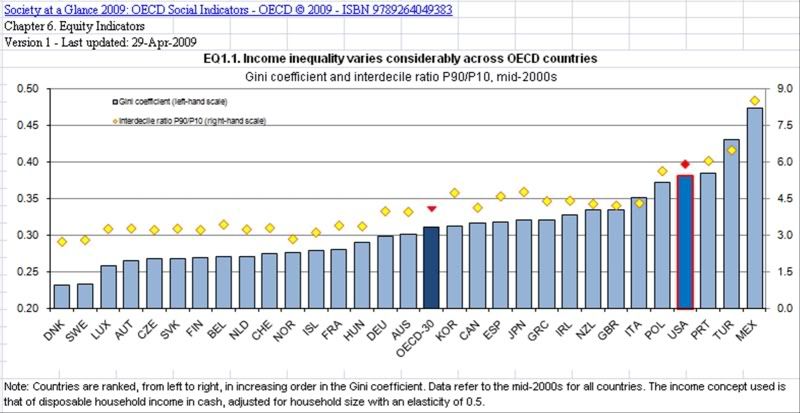
Nevertheless, Income Inequality Has Been Getting Worse Everywhere:
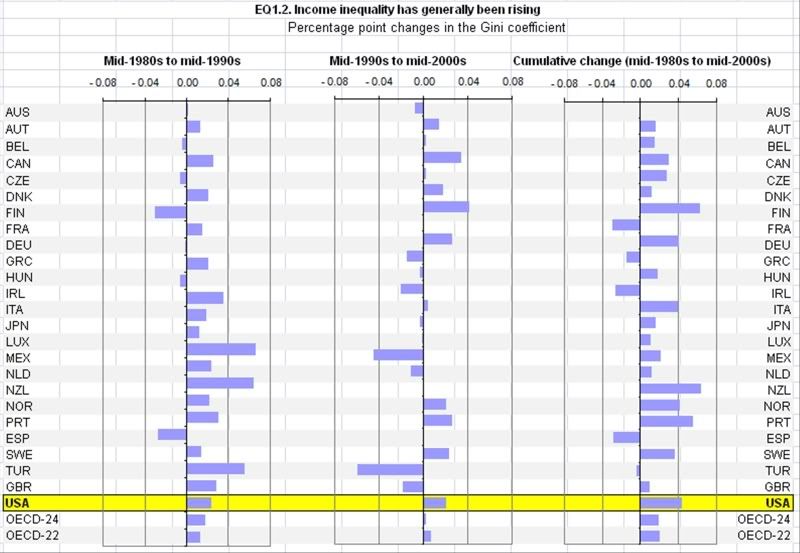
On the other hand, it is much worse in U.S. then almost anywhere else. Out of the 30 developed nations, the U.S. is the third worst in income inequality... trailing only Mexico and Turkey. But yippee... we are tied with Portugal.
What globalism has really meant is that the same "neoliberal" free market fundamentalism that promoted a small number to become filthy rich and income and wealth stagnation for the large majority has been in play throughout the developed world. It is not just America, though worse here.
And though it is admittedly a repetitious redundancy to point this out here, what is truly amazing is how following the global economic meltdown that they caused, the same selfish forces of reaction have also been winning the clean-up battle to preserve their privilege and screw the rest of us in formulating more bad policies. Everywhere, not just in America, instead of being discredited and cast aside, the same bad actors and bad policies have managed to distort what happened and why in order to retain both political control and wealth (.pdf).
Today’s Guardian has a good piece calling for left leaning economist of the world to unite, and rally against the austerity measures that are making things worse for the majority, while protecting the plutocrats who are in charge. And the great folks at ThinkProgress are all over it every day.
Of course here at home thoroughly mainstream, more or less progressive economists, such as Krugman and DeLong have pointed out repeatedly that while the specific Greece’s problems were not the same as Ireland, which were not exactly the same as Iceland or Portugal or UK or Spain. But everywhere the banks, financial markets and wealthy are getting bailed out, taxes on the wealthy continue to flat or lowered; effective total taxes on the middle and working class are flat or going up; and government services are being cut for the middle class, working class and poor.
Everywhere those who are actually in power are able to call is for even more of the same policies that got us into this mess, less government spending, less taxes for the wealthy and corporate, and less regulation and less oversight... ad nauseum.
And, as the weakening of the UK economy since conservative austerity measures began to kick in, everywhere they are wrong.
So in honor of May 1st Labor Day let us remember that the deficit is NOT the problem.
The real problem, as it has been for 40 years, in income stagnation over 90% of us and the rise in inequality in income, wealth and political power.
Income Inequality: The Top 10%
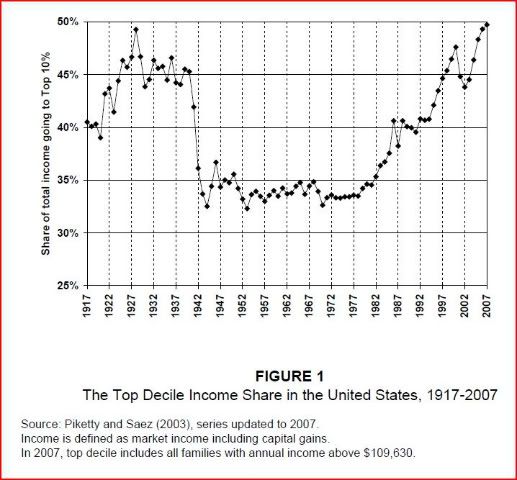
It is so bad, that even within that top 10% is mostly the top 1%:
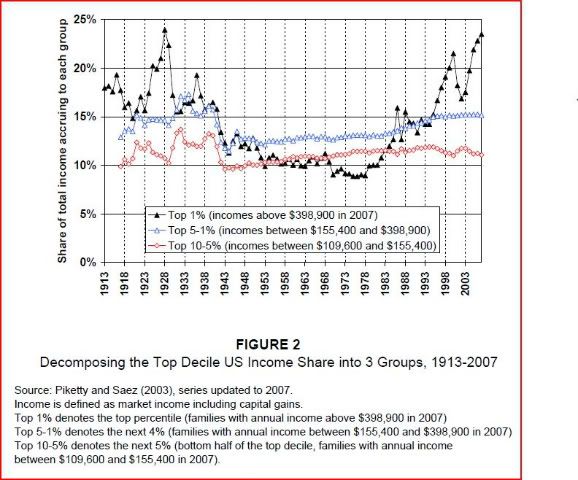
And yes, the top 0.01% is disproportionately the driver of that!
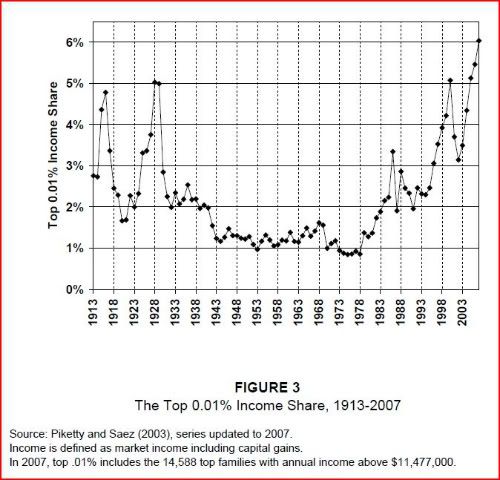
This is of course where the "rage of the haves" comes from. The upper middle class, who are well off by any honest comparison to the real distribution in America, hob-nob and compare themselves to the truly wealthy. And think they are doing poorly. And, instead of making solidarity with the working class and true middle, blame them instead.
I and my family are an example of this: When I was growing up, in the 1960s-1970s, my quite liberal parents told me all about how America was the land of opportunity, being the first (in my father's case) or second (on my mom's side) generation from immigration and going to college and getting ahead. And how all this was different then democratic but still class ridden Europe. And, per the graphs above, it probably had been true for the period when they had grown up in the 1930s-1960s. Alas, just in time for me to go off to college, was the end of the period of the great leveling, and the rise of the new Gilded Era.
As one personal indicator of just how ridiculous it is: My wife and I are both doctors. We are both completely salaried, and non-entrepreneurs, in relatively speaking low-income specialties. Compared to the median American, we do very very well. But even we are falling relatively behind compared to our Manhattan neighbors who are in FIRE (Finance, Insurance, and Real Estate). And just saying that is so ridiculous in so many ways. :)
So what did the OECD report find as the cause of all this?
Key Findings of Growing Unequal
Why is the gap between rich and poor growing?
1. In most countries the gap is growing because rich households have done significantly better than middle-class and poor households.
2. Changes in the structure of the population and in the labour market over the past 20 years have contributed greatly to this rise in inequality.
3. Wages have been improving for those people who were already well paid.
4. Employment rates have been dropping among less-educated people.
And, there are more single-adult and single-family households.
Who is most affected?
1. Statisticians and economists assess poverty in relation to average incomes.
2. Typically, they take the poverty line to be equivalent to one-half of the median income in a given country.
3. Since 1980, poverty among the elderly has fallen in OECD countries.
By contrast, poverty among young adults and families with children has increased.
4. On average, one child out of every eight living in an OECD country in 2005 was living in poverty.
What does this mean for future generations?
1. Social mobility is generally higher in countries where income inequalities are relatively low.
2. In countries with high income inequalities, by contrast, mobility tends to be lower.
3. Children living in countries where there is large gap between rich and poor are less likely to improve on the education and income attainments of their parents than children living in countries with low income inequality.
4. Countries like Denmark and Australia have higher social mobility, while the United States, United Kingdom and Italy have lower mobility.
What can be done?
1. In some cases, government policies of taxation and redistribution of income have helped to counteract widening inequalities, but this cannot be their only response.
2. Governments must also improve their policies in other areas.
3. Education policies should aim to equip people with the skills they need in today’s labour market.
4. Active employment policies are needed to help unemployed people find work.
5. Access to paid employment is key to reducing the risk of poverty, but getting a job does not necessarily mean you are in the clear. Growing Unequal? found that over half of all households in poverty have at least some income from work.
6. Welfare-in-work policies can help hard-pressed working families to have a decent standard of living by supplementing their incomes.
Needless to say, the OECD did not directly take on other issues such as "free trade" versus fair trade that include workers rights and not just the rights of capital. They did not directly take on the need to reign in the financialization of everything.
As the current public employee labor fights show, intra-class warfare is killing us. Poor, working and middle class folks in the private sector are being told to be jealous of and so fight against the unionized public sector workforce. Rather than make common cause with them for better wages and benefits. "What's the Matter Kansas" (Wisconsin, Ohio, Michigan, Indiana) indeed.
As for me, I will certainly vote for any Democrat over any Republican. Alas, third party (green, independent, whatever) in America are just a selfish and lazy excuse for doing nothing useful. All that time and energy is better spent -- as the Christianity right and tea party folks demonstrate -- in taking over the your local Democratic party apparatus. And as the 2010 midterms showed, not voting is a path to worse disaster. But long gone are the days when I will actively (time, money) support any politician who does point out the primacy of wages, income, labor, poverty and inequality. And I will oppose any politician who starts off by talking about the problem of the deficit. And bad Democrats need to be primaried from the left, even at the risk of losing. They need the threat and fear from the left to counter the money they get from the rich and corporate.
As to immediate activism, there is a glimmer of hope with UnCut for the America and the related Make them Pay and Mainstreet Movement... fighting for a better America and the World.
1 comment:
This is a few months behind, but thanks for the post. Some great links to some good reads and some good points.
Post a Comment